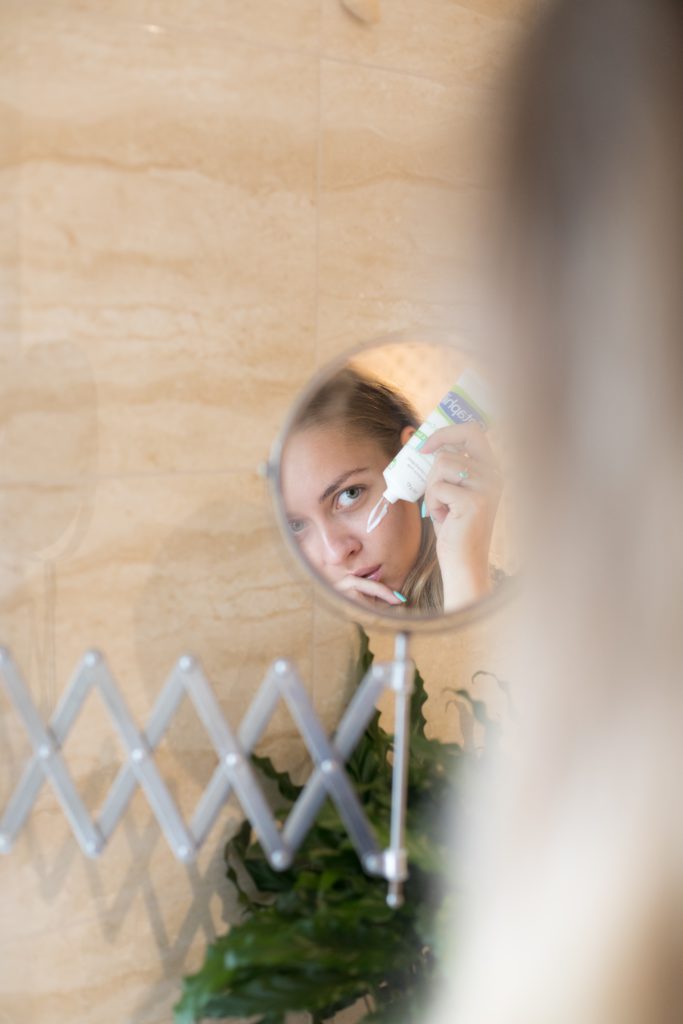The sun can sometimes get a bad rap for its harmful effects. However, sunlight has various positive effects on overall well-being as well. In order to enjoy all that the sun has to offer, it’s important to properly understand both the benefits and risks it may pose. Keep reading to learn how the sun affects your health!
Benefits

Enhanced Mood – The lack of sunlight during the winter months can trigger negative moods or even seasonal depression in some cases. As the days get longer and sunnier in the summer, you may notice a positive shift in your overall mood. Sunlight can actually boost serotonin levels in the brain, naturally putting you in a better mood during the summer.
Stress Relief – Nature therapy has become an increasingly popular method for combatting anxiousness. Green spaces and sunlight can actually decrease feelings of stress and have a positive impact on well-being, even if it’s just through images or sounds of nature. You can practice nature therapy by exercising outdoors, partaking in relaxing hobbies, going for a walk, or just stepping outside for some fresh air throughout your day. All of these are great ways to nurture your mental health this summer!

Higher Vitamin D Levels – Healthy vitamin D levels play a large role in various functions throughout the body. Vitamin D not only maintains strong bones and teeth, but also supports the immune system, boosts cardiovascular health, and reduces depression. The most natural source of vitamin D comes from regular sun exposure. However, it does not require an entire day baking in the sun to manage your vitamin D levels. All you need is roughly 10 to 30 minutes outdoors each day. Just don’t forget to put on sunscreen!
Improved Quality of Rest – The reason our bodies wind down at night is because of the brain’s melatonin production. When it’s dark, your brain will create more melatonin to get your body tired enough to sleep. This explains why, in the winter, you may feel more fatigued since the days are shorter and it gets darker earlier. During the sunnier months, you may start to feel more awake since the sun sets much later. It’s important to note that artificial light sources, such as cell phones, computer screens, and televisions, can disrupt your melatonin levels as your body may confuse these for real sunlight, keeping you up at night. So be sure to put down the electronics before going to bed for the ultimate good night’s sleep!

Risks
Premature Aging – Excess sun exposure over time can disrupt the health of your skin and hair leading to the development of wrinkles, sun spots, hair thinning, and gray strands. If you’re not careful, these can start appearing much earlier in life causing you to age prematurely. To protect your skin from harm, you should always use sunscreen no matter what time of year it is. You can use skin-care or makeup products that contain SPF so it’s a one-and-done application. For your hair, it’s a good idea to use a strengthening shampoo and conditioner combination specifically designed to reduce thinning and promote hair durability. This will help limit shedding and keep your strands substantially moisturized.
Heat Exhaustion – When your body experiences an excess loss of water and salt, you may be at risk for heat exhaustion. This typically happens on hot days when you’re outside, sweating, and not drinking enough water. Symptoms of this include headaches, nausea, thirst, and dizziness. The best way to avoid this is by drinking plenty of water throughout the day. The suggested amount of water you should drink each day is roughly eight 8oz glasses. However, when in the heat or being active, you should always increase your intake.
Sunburn – Most people experience sunburn at least at one point in their lives. Sunburns happen so easily because their full effects aren’t apparent until a few hours after sun exposure. You may notice redness, pain, swelling, or even flu-like symptoms in some cases. Whenever you step outside, keep a close eye on your skin, and try to stay in the shade as much as possible.
Eye Damage – Sunglasses are a great fashion accessory, but they’re an even better accessory for your eye health. Overexposure to the sun can cause eye damage and lead to an eye sunburn. The same can happen if you look directly at the sun or other bright light sources. This is why it’s crucial to always wear sunglasses when outside, driving in the car, and especially when in the water. Make sure they’re marked as 100% UV protective sunglasses to ensure optimal safety.

Protect yourself with care so that you can enjoy the benefits of sunlight rather than reap the risks. Here is a summary of what to keep in mind!
- Always use sunscreen before going outside. Be sure to reapply every two hours and more frequently if you sweat or go swimming.
- Stay in the shade when possible as you still will benefit from the sunlight even if not directly in it. This will help prevent heat exhaustion and sunburn.
- Wear sunglasses when outside, driving, or if you’re by reflective surfaces, such as sand, snow, or water.
- Drink plenty of water to ensure optimal hydration. It’s also good to incorporate an electrolyte drink throughout the day to keep your potassium levels up to combat heat exhaustion.

